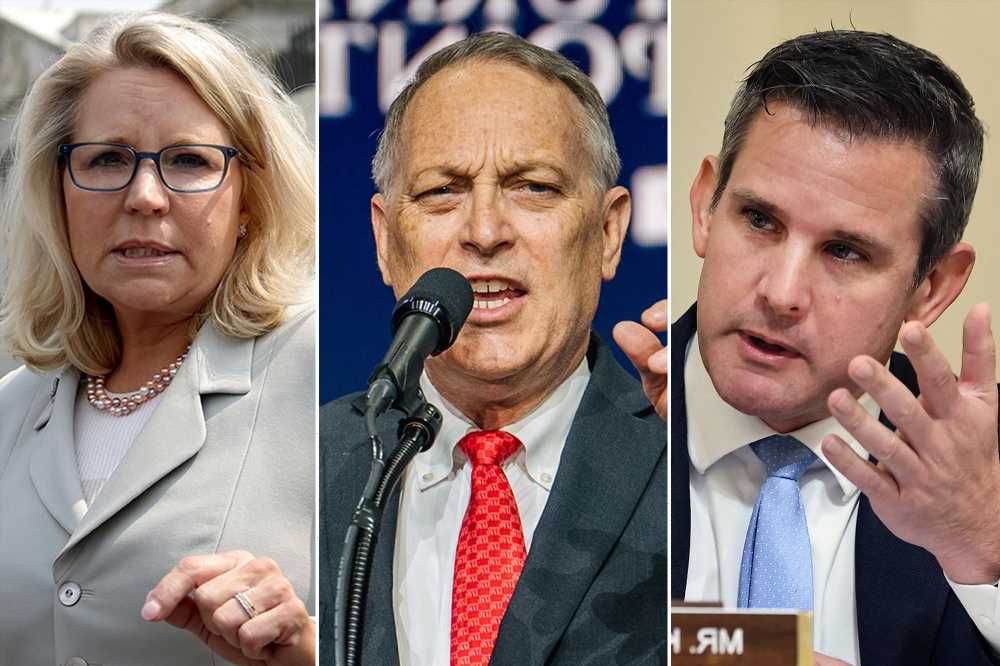More On:
republicans
Trump, lawmakers honor Sen. Mike Enzi after sudden death from bike accident
Manchin warns ‘everything could fall apart’ if bipartisan infrastructure bill fails
McCarthy bid to force Pelosi to take Jan. 6 committee picks fails
Schumer says Senate may have to work through weekend on stalled infrastructure bill
Freedom Caucus Chairman Andy Biggs introduced a resolution aimed at removing Republican Reps. Liz Cheney, of Wyoming and Adam Kinzinger, of Illinois, from the House GOP conference Tuesday morning, two lawmakers confirmed to The Post.
Biggs (R-Ariz.) pointed to Cheney and Kinzinger’s decision to accept Speaker Nancy Pelosi’s (D-Calif.) invitation to sit on the Jan. 6 select committee, which a sizable number of GOP lawmakers have alleged is politically motivated and skewed in Democrats’ favor.
Kinzinger and Cheney’s decision to buck party lines and serve on the panel has been met with sharp backlash from a number of their colleagues, with House Minority Leader Kevin McCarthy (R-Calif.) going as far as referring to them as “Pelosi Republicans.” The call to oust them from the House GOP conference has been met with praise conservative hardliners.
“I am extremely supportive of Representative Biggs’ resolution, which he attempted to introduce today,” Rep. Matt Rosendale (R-Mont.) said in a statement. “You can’t spend halftime in the opponent’s locker room and expect the team to welcome you back for the rest of the game. I hope the GOP Conference will seriously consider this.”
The Arizona Republican’s push to oust the two GOP Trump critics came as the select committee — which is tasked with investigating the deadly attack on the Capitol, when pro-Trump rioters stormed the building in an attempt to disrupt the certification of the election results — held its first hearing, where the panel heard from law enforcement officials who attempted protect the Capitol campus during the attack.
The resolution was referred to an internal committee, and is expected to be shut down by GOP leadership, one senior GOP source confirmed. It would need the support of two-thirds of the conference to pass, a difficult task with both Cheney and Kinzinger retaining a number of allies within the party.
Biggs is also leading the efforts in pushing House Minority Leader Kevin McCarthy (R-Calif.) to introduce a privileged resolution to vacate the chair, which would effectively remove Pelosi as Speaker. The measure also faces a nearly impossible path to passage in the Democrat-controlled lower chamber.
Both resolutions could prove to be hurdles for McCarthy, who will need the support of conservative hardliners and Trump allies to obtain the Speaker’s gavel if Republicans take back the majority in the midterms.
Multiple GOP sources noted that a failed attempt to oust Pelosi on the floor or unsuccessfully take disciplinary action against Cheney or Kinzinger could have unintended consequences, including distracting from their messaging efforts.
“If it comes to the floor, we don’t have the votes. And honestly our best path to vacating the chair is November 2022,” one senior GOP aide said.
While McCarthy previously said it should be up to the conference whether the two lawmakers remain in the committee assignments, the push to revoke Cheney and Kinzinger’s seats on standing committees also faces an uphill climb as it would be subject to a floor vote.
“Kevin has completely boxed himself in because he claimed he would strip Cheney of her committees, and now if he doesn’t follow through he looks weak, but if he allows it to go forward, the Democrats will defeat it on the floor, and be emboldened to start getting involved in our committee assignment decisions,” another senior GOP aide told The Post.
“Kevin only doesn’t want the motion to vacate to go through because he’s terrified it will be used against him if he becomes Speaker and that’s why he’s scrambling to defeat it.”
Biggs’ latest efforts follow a group of conservatives successfully removing Cheney — who previously served as House Republican conference chair— from her leadership position in May, with critics arguing her criticisms of Trump did not align with the views of the majority of the party. Rep. Elise Stefanik (R-N.Y.), a staunch Trump ally, was elected shortly after the Wyoming Republicans ouster from the No. 3 position in House GOP leadership.
While both Cheney and Kinzinger have come under fire for their criticisms of Trump — with both facing primary challengers in addition to taking heat from — they have stood by their position to speak out against Trump’s rhetoric.
In Cheney’s opening remarks during the select committee hearing, she defended her conservative credentials, stating that she “disagreed sharply on policy and politics with almost every Democratic member on this Committee. But, in the end, we are one nation under God.”
She went on to take a swing at GOP lawmakers that have downplayed the severity of the attack on the Capitol.
“We must overcome the many efforts we are already seeing to cover up and obscure the facts. On Jan. 6th and the days thereafter, almost all members of my party recognized the events that day for what they actually were,” Cheney, the daughter of former Vice President Dick Cheney, continued.
While Republicans have repeatedly blasted the committee, ramping up criticisms after Pelosi blocked two of McCarthy’s five selections — Reps. Jim Banks (R-Ind.) and Jim Jordan (R-Ohio) — from serving on the panel, Pelosi has dismissed accusations that it is a partisan ploy to take aim at Trump.
The California Democrat has repeatedly cited Cheney and Kinzinger’s participation while defending the probe as nonpartisan, noting that Republicans in the Senate blocked a bipartisan agreement to establish a 9/11-style panel to investigate the attack.
Share this article:
Source: Read Full Article










